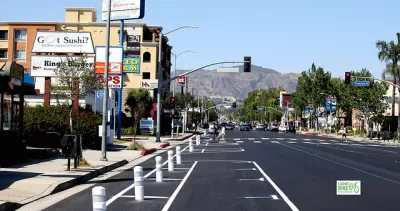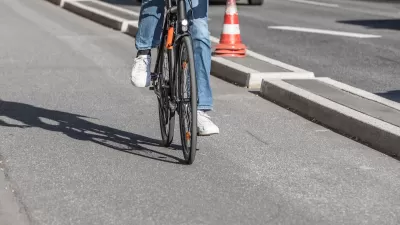The agency’s detailed list of actions highlights the many changes needed to truly implement Complete Streets principles into California road construction and maintenance.

The California Department of Transportation has issued a Complete Streets Action Plan detailing the efforts the agency will undertake to promote more equitable and safe transportation. As Melanie Curry reports for Streetsblog California, “The actions are categorized into general areas such as data collection, policies, and guidance, and includes which division or district is responsible and when the task is to be completed. This action plan focuses on tasks to be done within 2022 and 2023.”
In an introduction to the plan, Caltrans director Tony Tavares writes, “As a Department, we recognize that investments in walking, biking, transit, and passenger rail can produce meaningful and transformative projects that can help to address legacy impacts on underserved communities that have been historically segmented and harmed by our state’s transportation network.”
According to Curry, actions planned for 2022 include “Developing minimum expectations for complete streets facilities,” “Developing an active transportation benefit/cost tool that can be used for project evaluations statewide,” and “Creating a database of active transportation projects on the state highway system that are ready for funding.” Because Caltrans districts across the state are at different stages in developing their Complete Streets plan, the document outlines different actions based on a district’s specific needs.
Curry notes that “some of the tasks are extremely basic first steps towards building capacity at Caltrans to make this policy switch,” pointing out that “The detailed task list also shows just how far the state needs to go before Caltrans can claim that Complete Streets are fully incorporated into its work.”
FULL STORY: Caltrans’ Plan for Making Complete Streets a Priority

Alabama: Trump Terminates Settlements for Black Communities Harmed By Raw Sewage
Trump deemed the landmark civil rights agreement “illegal DEI and environmental justice policy.”

Study: Maui’s Plan to Convert Vacation Rentals to Long-Term Housing Could Cause Nearly $1 Billion Economic Loss
The plan would reduce visitor accommodation by 25% resulting in 1,900 jobs lost.

Planetizen Federal Action Tracker
A weekly monitor of how Trump’s orders and actions are impacting planners and planning in America.

Wind Energy on the Rise Despite Federal Policy Reversal
The Trump administration is revoking federal support for renewable energy, but demand for new projects continues unabated.

Passengers Flock to Caltrain After Electrification
The new electric trains are running faster and more reliably, leading to strong ridership growth on the Bay Area rail system.

Texas Churches Rally Behind ‘Yes in God’s Back Yard’ Legislation
Religious leaders want the state to reduce zoning regulations to streamline leasing church-owned land to housing developers.
Urban Design for Planners 1: Software Tools
This six-course series explores essential urban design concepts using open source software and equips planners with the tools they need to participate fully in the urban design process.
Planning for Universal Design
Learn the tools for implementing Universal Design in planning regulations.
Caltrans
Smith Gee Studio
Institute for Housing and Urban Development Studies (IHS)
City of Grandview
Harvard GSD Executive Education
Toledo-Lucas County Plan Commissions
Salt Lake City
NYU Wagner Graduate School of Public Service





























